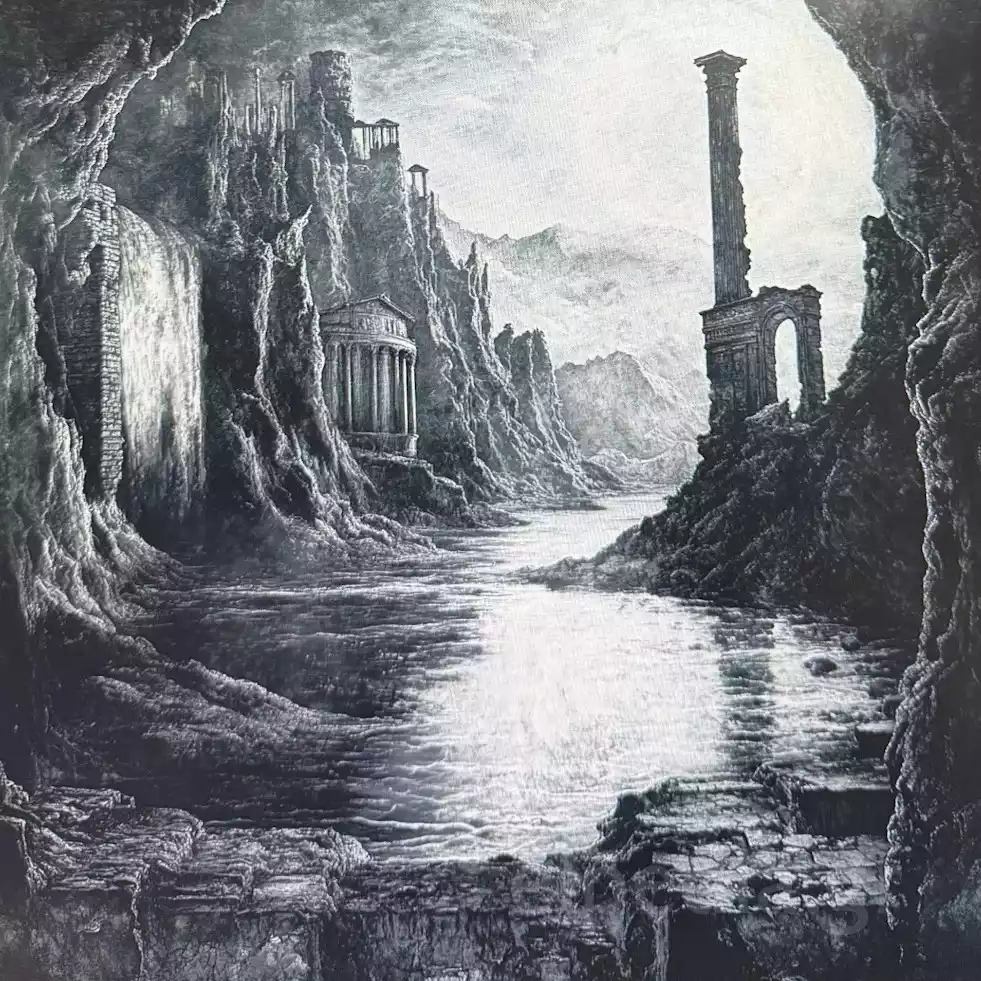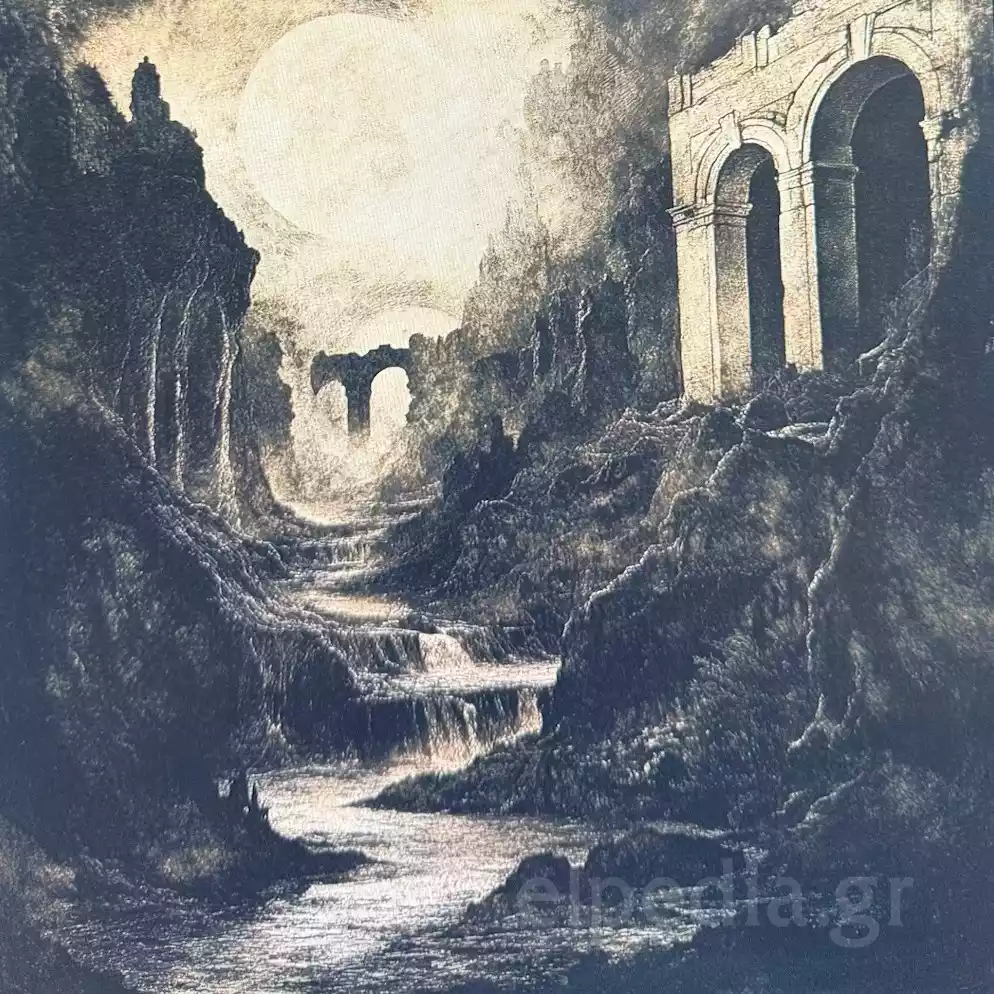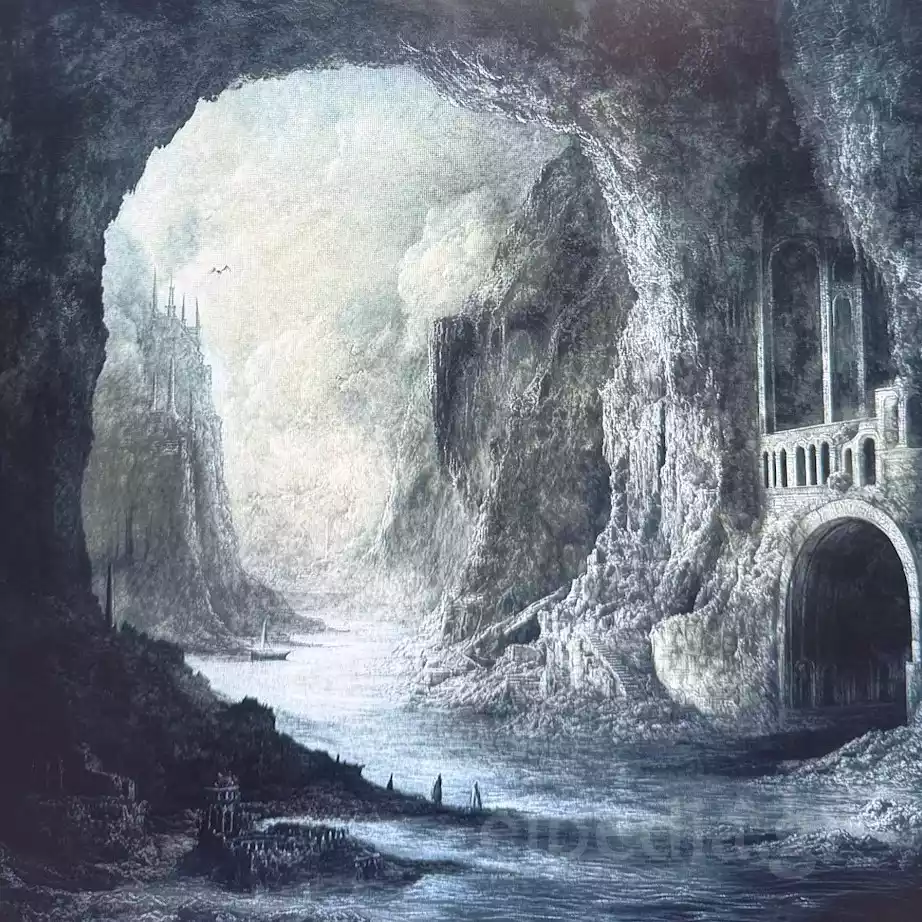
The river Lethe flows calmly through the dark landscape of the Underworld, carrying the power of forgetfulness according to Greek Mythology.
In the vast and often dark world of Greek mythology, few elements capture the imagination as much as the rivers of the Underworld. Among them, Lethe holds a special place, not as a passage of punishment or suffering, but as a source of absolute forgetfulness. Imagine a river whose waters have the power to erase every memory of earthly life, every joy, every pain, every bond. This is the essence of Lethe, the personified forgetfulness and one of the five mythical rivers that traversed the realm of Hades. The ancient Greeks believed that the souls of the dead, before possibly being reincarnated or entering the Elysian Fields, had to drink from the waters of Lethe to forget their past. This act was not necessarily a punishment, but rather a necessary purification, a resetting of the past so that the soul could move forward (consider the psychological need for forgetfulness after traumatic experiences). The concept of forgetfulness, this absolute release from the burden of memories, permeates ancient thought and influenced philosophers and poets. In the Underworld, Lethe was not just a geographical feature, but a powerful deity and a fundamental process in the afterlife existence (Mouzakēs).
Lethe’s Domain: Navigating the Waters of Forgetfulness
Within the intricate geography of the Greek Underworld, the River Lethe holds a unique and profound significance. Unlike the Styx, the river of hateful oaths, or Acheron, the river of woe, Lethe offered passage not through suffering, but through oblivion. Its waters possessed the power to erase all memory of mortal life. The topography of Hades, with its various rivers and pools, often mirrored the physical landscapes of Greece, grounding these myths in a semblance of reality (Waggoner).
To drink from Lethe was to shed the burdens of the past – the joys, sorrows, loves, and losses that defined one’s earthly existence. This act could be interpreted as a profound mercy, freeing the soul from trauma and regret before entering Elysium or embarking on a new life through reincarnation. Conversely, it represented the ultimate loss of self, erasing the very experiences that shaped identity. This duality makes Lethe a compelling symbol of the complex relationship beings have with memory and forgetting.
The Lethe in Mythic Cycles and Ancient Ritual
The most detailed account of Lethe’s function comes from Plato’s Myth of Er, found in his Republic. Here, souls destined for reincarnation journey across the desolate Plain of Lethe to drink from the River Ameles (“Uncaring”). The amount consumed dictates the degree of forgetfulness, with less wise souls drinking deeply and forgetting all, while philosophers drink sparingly, retaining some memory of eternal truths. This narrative firmly establishes Lethe as a crucial mechanism in the ancient Greek understanding of the soul’s cyclical journey.
Beyond philosophical myth, the concept permeated actual practice. The geographer Pausanias described the Oracle of Trophonius in Boeotia, where supplicants drank from two springs before receiving prophecies: first from Lethe, to forget their worldly concerns, and then from Mnemosyne (Memory), to remember the divine revelations. This illustrates a fascinating ritual application, where controlled forgetting was deemed necessary to receive new knowledge, a concept explored in various myths (Aesop, Noukios, & Aitolos).
Lethe’s Enduring Legacy in Western Thought
The evocative image of the river of oblivion has resonated through centuries of Western culture, long after the decline of ancient Greek religion. Virgil’s Aeneid depicts souls crowding Lethe’s banks, eager to forget before returning to the world above. Dante placed Lethe in the Earthly Paradise atop Mount Purgatory, where souls washed away the memory of sin. From Renaissance art to Romantic poetry (where themes of memory and oblivion are particularly potent in English literature) and modern narratives, Lethe endures as a powerful metaphor for forgetting, escape, the erasure of the past, or sometimes, a necessary blank slate (Dēmoula).
Lethe and Mnemosyne: Two Opposing Forces
Lethe and Mnemosyne form a fundamental dichotomy in Greek mythology and philosophy. Mnemosyne, mother of the Muses by Zeus, was the goddess of memory, remembrance, and the wisdom that comes from knowledge of the past. She represented the preservation of history, poetry, art, and knowledge – all that connects the present with the past and shapes culture. Lethe, on the other hand, was the absence of all these, the erasure, the return to the void of ignorance. However, their relationship was not always merely antagonistic. As we saw in the example of the oracle of Trophonius, forgetfulness could be a prerequisite for acquiring new knowledge or experience. Forgetting old failures or prejudices could pave the way for a clear perception. In the Platonic myth, forgetfulness is necessary for reintegration into the cycle of life, while recollection (not the full memory of the previous life, but the recollection of Ideas) is the path to philosophical enlightenment. Therefore, forgetfulness is not exclusively negative. It can be a form of purification, a necessary redemption from a burdensome past, or a void that allows for the creation of the new. Poetry often explores this ambiguity, presenting forgetfulness as a blessing or a curse, depending on the context (search: Hesiod Theogony). Kiki Dimoula, in a more contemporary approach, describes Lethe as a force that “orchestrates the quick death of memory” to offer solace (Dimoula).

Lethe, the calm deity of forgetfulness, is often associated with Night and Sleep, governing the loss of memory in Greek Mythology.
The Symbolism of Lethe’s Water
Water itself as an element carries rich symbolism in all cultures: purification, life, rebirth, but also depth, mystery, danger. In the case of Lethe, water acquires a very specific property: that of inducing forgetfulness. Drinking from Lethe is not just an act of quenching thirst, but a ritual act of transforming consciousness. The water acts as a solvent of memory, cleansing the soul of its past. This is connected to the broader significance of water passages in the Underworld, such as crossing the Styx or Acheron with Charon’s boat. These crossings symbolize the transition from one state of existence to another. Lethe’s water completes this transition, ensuring that the soul does not carry the burdens of the previous life into the next phase, whether it is eternal rest, punishment, or return to the world of the living. The idea of a river that erases memory perhaps echoes the human experience of memory loss due to trauma, old age, or illness, projecting these fears and realities onto the mythical level of the afterlife journey. The flow of the river also symbolizes the passage of time and the inevitable decay it brings, including the decay of memories. The image of a river as a bearer of forgetfulness is powerful and enduring (Aesop, Noukios, and Aetolos).
Lethe in Literature and Art
The powerful image of the river of forgetfulness and the eponymous deity was not limited to ancient myths and philosophy. It became a source of inspiration for poets, writers, and artists throughout the centuries, from antiquity to the present. Virgil in the Aeneid describes souls gathering on the banks of Lethe, waiting to drink and forget before being reincarnated. Dante in the Divine Comedy places Lethe in the Earthly Paradise, at the top of the mountain of Purgatory. There, souls drink from its waters to forget their sins, before drinking from the river Eunoe to remember their good deeds, thus completing their purification. In modern literature and poetry, Lethe is often used metaphorically to symbolize loss, redemption from painful memories, denial of the past, or deliberate ignorance. The concept of “water of forgetfulness” has become a commonplace to describe the desire to escape from sorrow or guilt. The study of folk poetry reveals how the idea of forgetfulness survives and is transformed, linking the ancient myth with newer traditions about death and the underworld (Anagnōstopoulos). In visual art, Lethe is depicted less frequently than other scenes of the Underworld, but appears in works depicting Orpheus, Aeneas, or Heracles in Hades, often as a calm river flowing languidly through the dark landscape.
Different Interpretations & Critical Assessment
The interpretation of Lethe is not unambiguous and has occupied various scholars. While its Platonic dimension as a tool of reincarnation is dominant, researchers like Pierre Commelin focus on the psychological need for forgetfulness, seeing it as redemption from trauma (Commelin). Others, like Ioannis Anagnostopoulos, examine its survival in folk traditions, emphasizing its connection to perceptions of death and the afterlife outside the philosophical sphere. Kiki Dimoula approaches Lethe poetically, as an active force that shapes our perception of the past. Its exact function and symbolism may vary depending on the source and era, reflecting the changing perceptions of memory, identity, and the afterlife in the ancient Greek world.

The Plain of Lethe in the Platonic myth, a place of transition where souls are freed from their past through forgetfulness.
Epilogue
Lethe, the mythical river of forgetfulness, remains one of the most fascinating and multifaceted elements of Greek mythology. More than just a geographical feature of the Underworld, it embodies the ancient human preoccupation with the nature of memory and forgetfulness. Whether as a prerequisite for reincarnation in the Platonic myth, or as a deity-daughter of Eris or Night, or as a source of redemptive or painful amnesia in literature, Lethe poses fundamental questions about identity, knowledge, and human consciousness. Its dual nature, as a potential blessing and curse, as necessary purification and as loss of self, continues to inspire and challenge, reminding us of the fragile balance between remembering and forgetting that shapes our existence.
Frequently Asked Questions
What exactly is Lethe in Greek Mythology?
Lethe in Greek Mythology is primarily one of the five rivers of the Underworld. Its waters had the magical property of causing complete forgetfulness of the past to anyone who drank them. Additionally, Lethe was also the personification of forgetfulness itself, a minor deity or demon, often a daughter of Eris or Night.
Why did souls have to drink from the river of Lethe?
According mainly to Plato (Myth of Er), souls drank from the river of Lethe before reincarnation to forget their previous life and their experiences in the Underworld. This forgetfulness was considered necessary for them to start a new life without the burden of old memories in Greek Mythology.
What is the difference between Lethe and the other rivers of Hades?
While all the rivers of the Underworld had symbolic significance (Styx – oaths, Acheron – pain, Cocytus – lamentation, Phlegethon – fire), Lethe stood out for its property of causing forgetfulness. It was not a river of punishment or passage like the others, but a place of final purification or preparation for the next cycle of existence in Greek Mythology.
Is there a positive aspect to Lethe?
Yes, although forgetfulness often seems negative as a loss of memory, in Greek Mythology it could have a positive aspect. It was considered necessary for reincarnation, offering a “clean slate.” Also, the forgetfulness of painful experiences or guilt could be seen as a form of redemption or mental relief for the souls.
How is Lethe connected to Mnemosyne?
Lethe (forgetfulness) and Mnemosyne (memory) form a fundamental pair of opposites in Greek Mythology. Mnemosyne preserves the past and knowledge, while Lethe erases them. However, in some cases, such as at the oracle of Trophonius, forgetting the past was considered a necessary prerequisite for one to accept new knowledge or experience.
Bibliography
- Aesop, Noukios, Andronikos, and Georgios the Aetolian. Aesop’s Fables: The First Modern Greek Translations. 1993.
- Anagnōstopoulos, Ioannis Sp. Death and the Underworld in Folk Poetry. 1984.
- Commelin, Pierre. Greek and Roman Mythology. 2024.
- Dimoula, Kiki. The Playful Myth. 2011.
- Mouzakēs, Stelios A. Vampires: Beliefs, Preconceptions, and Traditions in …. 1987.
- Waggoner, Jamie. Hades: Myth, Magic & Modern Devotion. 2024.

